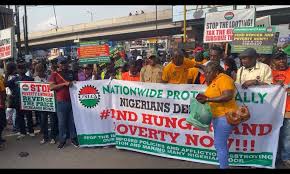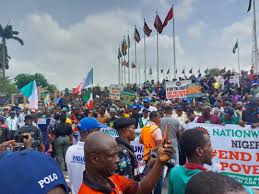
In a portion of Africa’s significant urban communities, youngsters are encountering a late spring of discontent as outrage and disappointment emit over debasement, the taking off cost for most everyday items, and far reaching joblessness.
The fights started in Kenya last month, where youngsters – especially Gen Z – participated in about a month and a half of exhibits over a disagreeable bill that tried to increase government rates. Something like 50 individuals kicked the bucket accordingly.
President William Ruto withdrew the bill and declared a purge of his bureau following strain from demonstrators who stayed in the city, saying they were despondent about supposed debasement and police mercilessness in his administration. There have been a few calls for him to leave.
Kenya, East Africa’s prevailing economy, has wrestled with raising living costs that have spiked food costs and different products, in the midst of an increasing joblessness rate among the nation’s childhood. The country likewise owes billions of dollars in unfamiliar and nearby obligations, spending a sizeable piece of its income reimbursing its leasers.
Military and police faculty capture nonconformists during the counter defilement fight in the Ugandan capital, Kampala, on July 23, 2024.
Military and police staff capture dissenters during the counter debasement fight in the Ugandan capital, Kampala, on July 23, 2024.
The distress quickly spread to adjoining Uganda, where residents endeavored to walk to the parliament in the capital, Kampala, on July 23 and 25. Security powers answered with a weighty clampdown, keeping in excess of 100 individuals, as per police reports.
Those fighting are irate about boundless government debasement in the country, which loses an expected Sh. 10 trillion ($2.7 billion) openly financing to unite yearly, as per Ugandan enemy of debasement body the Inspectorate of Government (IG).
Radio personality Faiza Fabz, who joined the fights, said via virtual entertainment that the exhibit was an “potential chance to redirect our country” and “power the pioneers to pay attention to us and requests of individuals at last.”
A portion of those requests incorporate “evaluating the way of life” of MPs “and publicizing it,” and the renunciation of legislators engaged with defilement outrages, as per a paper first page she shared via web-based entertainment stage X. Fabz was among the demonstrators kept by the Ugandan police.
Uganda has seen some dependability in its economy following “an oil-related development blast and strong development of farming,” as per the World Bank.
In any case, it has likewise wrestled with endemic debasement, scoring 26 keep going year on Straightforwardness Global’s Defilement Discernments Record, which positions nations on a size of zero to 100, with zero signifying “profoundly bad” and 100 meaning that a nation is “extremely perfect.”
A few high-profile Ugandan legislators were endorsed by the US and the Unified Realm for debasement recently, including the speaker of the nation’s parliament, Anita Annet Among, whom the dissenters approached to leave.
President Yoweri Museveni, 79, who has controlled Uganda with an iron clench hand for almost forty years, cautioned the dissenters they were “behaving recklessly,” and later applauded the security powers for “thwarting” the fights, and asserting without proof that they were coordinated with “financing from unfamiliar sources.”
‘Rude awakening for African pioneers’

In Africa’s most crowded country, Nigeria, youngsters are additionally arranging an “end awful administration” walk on August 1.
Youthful Nigerians calling for fights need a rest from the country’s financial burdens as expansion skyrockets to over 34%, its most elevated level in almost 30 years, causing one of the country’s most horrendously terrible at any point cost for most everyday items emergencies. Joblessness in the West African country has likewise been on the ascent, its information office said in its latest report, in February.
They likewise need the country’s security issues controlled in the midst of an ascent in kidnappings for deliver, among different requests, which incorporate “diminishing the typical cost for most everyday items, checking weakness, decreasing the expense of administration, discretionary change, legal change, and protected change,” as per a marked assertion from a gathering of common society associations.
Basic freedoms attorney Inibehe Effiong said in a meeting with Emerge TV on Sunday: “Individuals are worn out, individuals are eager… . For what reason does the president need to stand by work the first of August? He can begin this second to impact the progressions that individuals are requesting.”
The last time a significant dissent happened in Nigeria, security powers started shooting at unarmed nonconformists who were calmly exhibiting against supposed police severity, bringing about passings and wounds.
Unfortunate of a rehash of the 2020 #EndSARS fights, Nigerian President Bola Tinubu has called for quiet and entreated residents not to rampage.
Dissidents utilize a Kenya Police hostile to revolt safeguard to shield themselves from nerve gas canisters and elastic slugs during against government showings in midtown Nairobi, on July 2, 2024.
Related article Kenyan dissidents commitment to hold onto country’s primary air terminal as dangerous turmoil go on into 6th week
He cautioned that the arranged dissent “could deteriorate into brutality and set the nation in reverse,” charging that the forthcoming walk was being affected by residents with double ethnicity.
“The patrons of fights don’t adore our nation … They don’t figure out citizenship. They have elective travel papers. They are in various regions of the planet holding gatherings basically,” the president said.
A Nigerian safeguard representative said the arranged dissent could recreate lethal exhibitions in Kenya.
“The setting of this arranged dissent is to shadow what’s going on in Kenya … and … what’s going on in Kenya … is vicious … and stays unsettled,” representative Edward Buba said at a question and answer session, adding that “the tactical won’t hold on and permit disorder to happen to our country.”
For Gift Mugano, an assistant lecturer of financial matters at South Africa’s Durban College of Innovation, the young uprisings are “a rude awakening for African pioneers.”
“It resembles a dissent virus in light of the fact that the Kenya Gen Z development is animating the energy in other African nations,” Mugano told CNN.
That’s what he added “for however long there are no monetary open doors, and administration and law and order are not at their best, we won’t have security in the landmass.”
Mugano exhorted African legislatures against getting serious about dissidents, telling them to all things being equal “take care of issues influencing the landmass, set out monetary open doors and further develop administration.”
A ‘developing discontent’

Senegalese political expert Mamadou Thior repeated this feeling, let CNN know that the rising disappointment among Africa’s childhood could prompt agitation across the landmass.
“There is a developing discontent among youngsters (in Africa) and the people who are in control ought to focus on this development,” Thior said.
That’s what he added “youngsters are eager, and they believe things should change at an exceptionally fast speed.”
As per Thior, who drives the Senegalese media morals association CORED, youth activists across the landmass are associated through online entertainment, “and that is the reason what’s going on in Kenya can influence individuals in Uganda and, surprisingly, here in West Africa.”
Youth-drove uprisings against debasement and terrible administration have likewise emitted in different pieces of Africa, including Senegal and Ghana, lately.
Uganda’s Leader Yoweri Museveni talks during a Reuters interview at the Public Authority Organization (NALI) in Kyankwanzi region, Uganda December 4, 2021. Picture taken December 4, 2021. REUTERS/Abubaker Lubowa
Fights broke out in Senegal in February after its then-president Macky Sall reported a defer in the nation’s booked decisions. Following showings that left somewhere around three dissidents dead, Sall backtracked on the defer after the Senegalese sacred board disallowed his choice to delay the vote.
The decision matched with the arrival of numerous political prisoners, including current President Bassirou Diomaye Faye, who was delivered somewhat more than seven days before the political decision.
In the previous months, Ghana, Senegal’s kindred West African state, saw long periods of hostile to government fights as demonstrators jumped all over financial difficulties and joblessness.
Previous Nigerian President Olusegun Obasanjo cautioned that the mainland was on the edge of disorder.
“All over Africa, we are… perched on a barrel of explosive,” he said in a new meeting with CNN partner Resident television.
“There’s essentially no special case (country) in Africa where the young are not furious. They are jobless… unempowered and they see nothing other than sadness,” he said.
That’s what obasanjo cautioned “assuming no sufficient consideration is paid to the necessities of the adolescent in Africa … it will be appalling for us all.”




